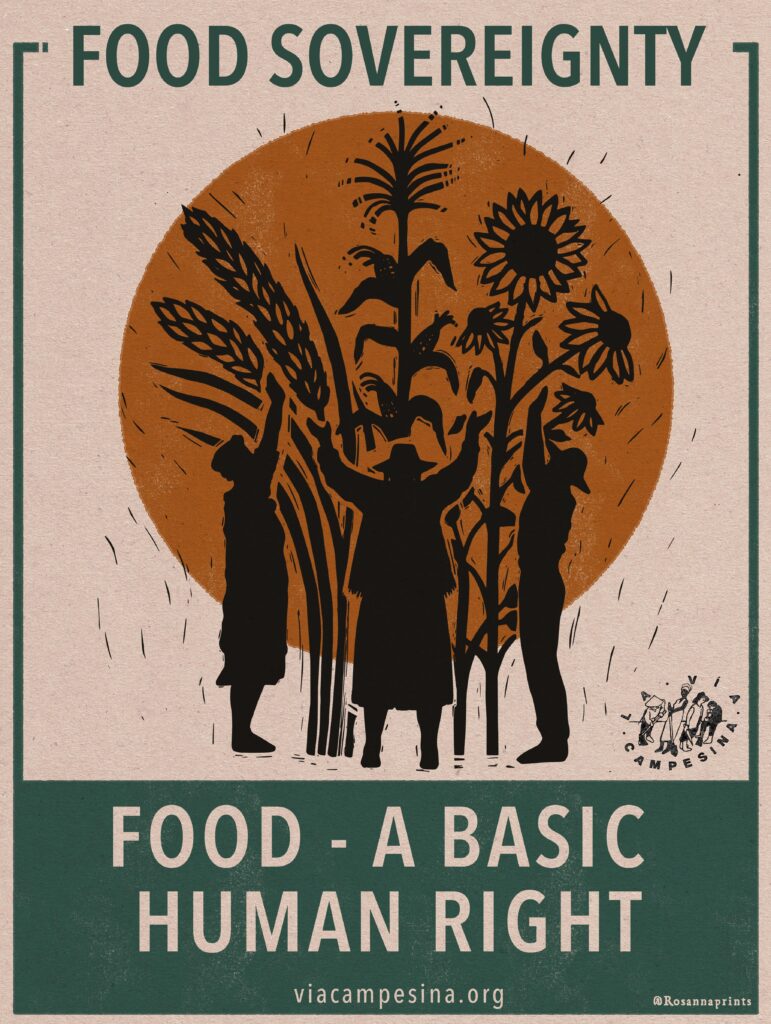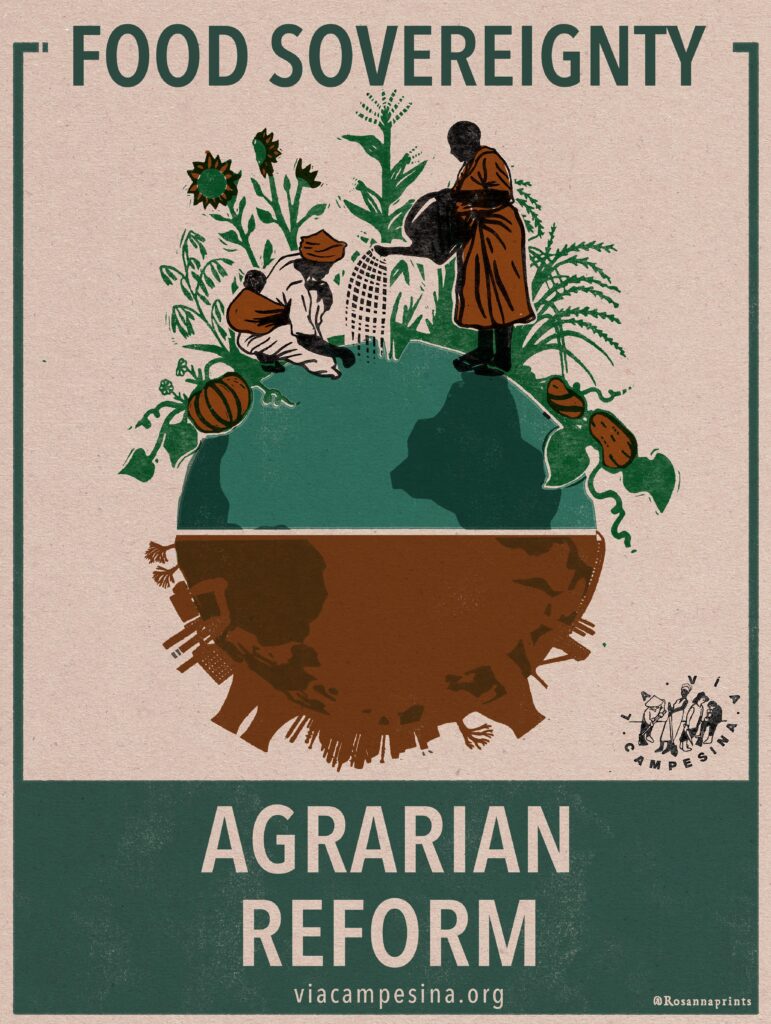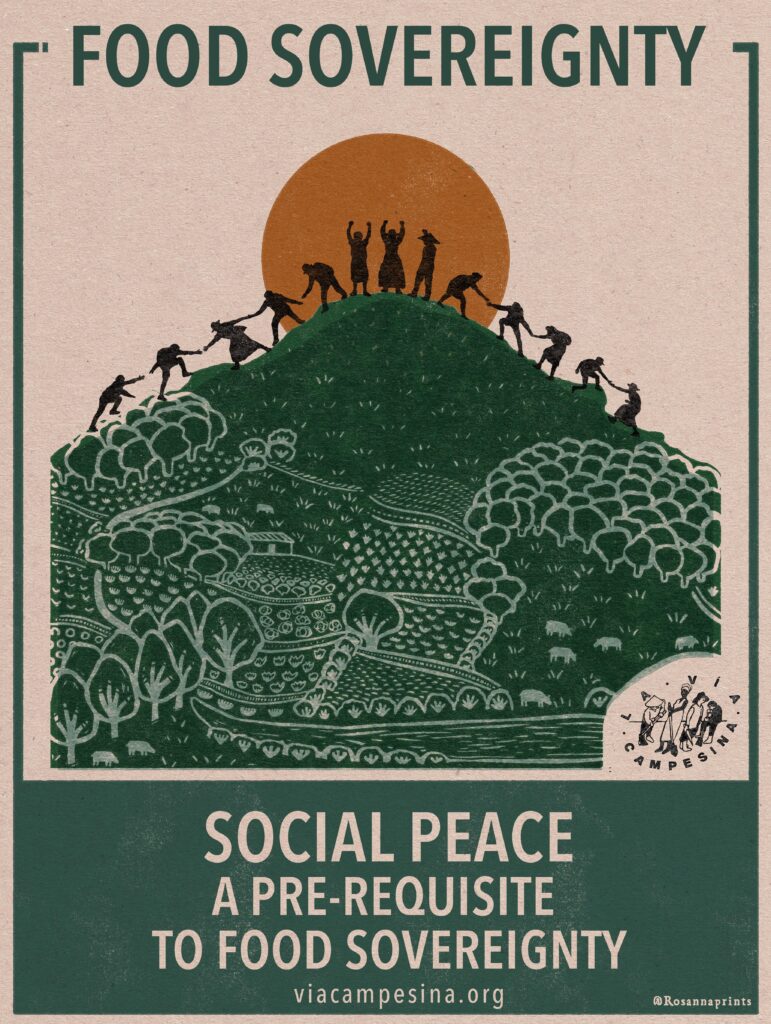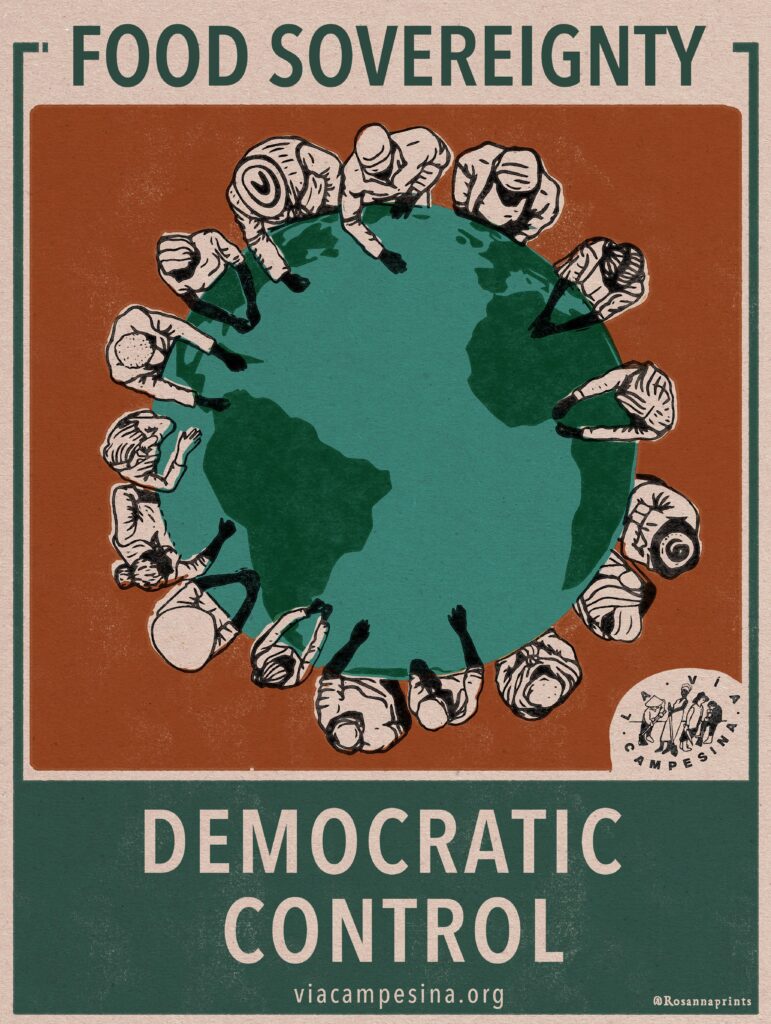La Via Campesina is launching a series of postcards that define our 25 years of collective construction and envisioning of Food Sovereignty. The series illustrates the key themes of the Food Sovereignty Declaration developed and shared during the 1996 UN Food Summit held in Rome.
This historical document was introduced to counter “the concept of Food Security” – inadequate to address the worsening global hunger and poverty – and the Free Trade Agreements (FTAs) of the World Trade Organisation (WTO), the main cause of such problems.
As we reflect collectively the struggle for Food Sovereignty after 25 years, the postcard series play an important role of illuminating the peasant struggle in the present and creating wider awareness among the youth so that they continue global struggles for the right to food, agrarian reform, protection of common goods, reorganization of the food trade, fight against hunger and social peace.
The postcards were developed by Rossana Morris, an artist of the Land Workers’ Alliance, a member of La Via Campesina based in the United Kingdom. We invite you to appreciate the art, learn more about the declaration and freely share with others. We will launch the print versions of the postcards soon.
FOOD SOVEREIGNTY: A FUTURE WITHOUT HUNGER
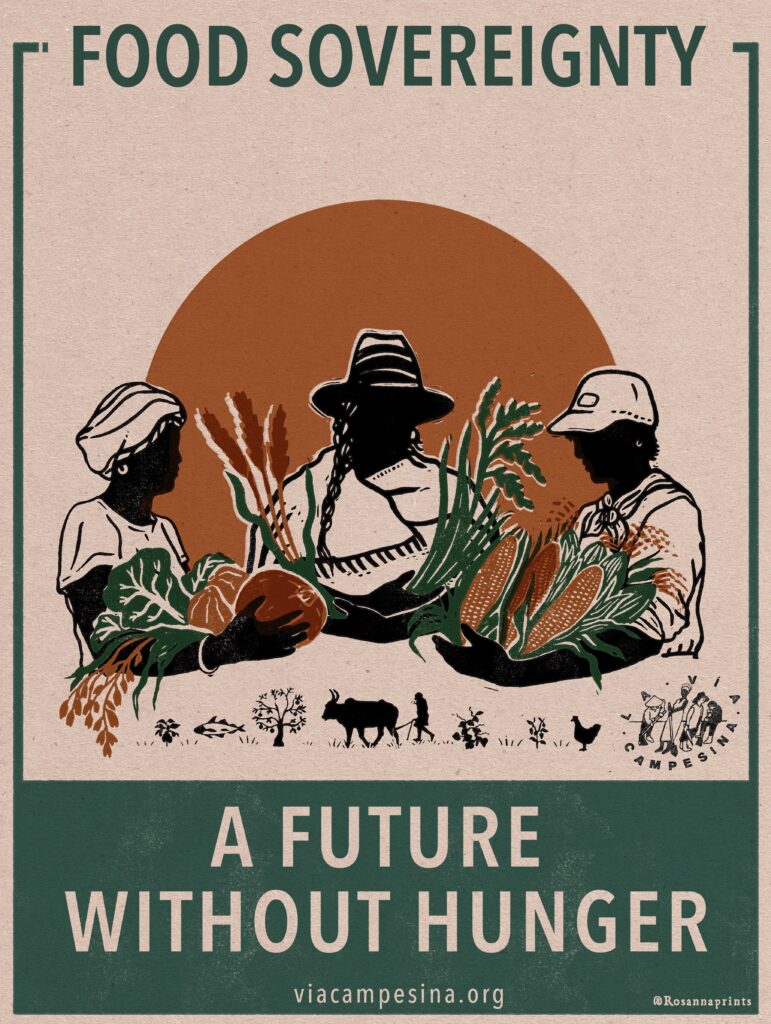
We, the Via Campesina, a growing movement of farm workers, peasant, farm and indigenous peoples’ organizations from all the regions of the world know that food security cannot be achieved without taking full account of those who produce food. Any discussion that ignores our contribution will fail to eradicate poverty and hunger.
Food is a basic human right. This right can only be realized in a system where food sovereignty is guaranteed. Food sovereignty is the right of each nation to maintain and develop its own capacity to produce its basic foods respecting cultural and productive diversity. We have the right to produce our own food in our own territory. Food sovereignty is a precondition to genuine food security.
We, the Via Campesina reject the economic and political conditions which destroy our livelihoods, our communities, our cultures and our natural environment. The liberalization of trade and its economic policies of structural adjustment have globalized poverty and hunger in the world and are destroying local productive capacities and rural societies. This corporate agenda takes no account of food security for people. It is an inequitable system that treats both nature and people as a means to an end with the sole aim of generating profits for a few. Peasants and small farmers are denied access to and control over land, water, seeds and natural resources. Our response to the increasingly hostile environment is to collectively challenge these conditions and develop alternatives.
We are determined to create rural economies which are based on respect for ourselves and the earth, on food sovereignty and fair trade. Women play a central role in household and community food sovereignty. Hence they have an inherent right to resources for food production, land, credit, capital, technology, education and social services, and equal opportunity to develop and employ their skills. We are convinced that the global problem of food insecurity can and must be resolved. Food sovereignty can only be achieved through solidarity and the political will to implement alternatives.
Long-term food security depends on those who produce food and care for the natural environment. As the stewards of food producing resources we hold the following principles as the necessary foundation for achieving food security.
FOOD – A BASIC HUMAN RIGHT
Food is a basic human right. Everyone must have access to safe, nutritious and culturally appropriate food in sufficient quantity and quality to sustain a healthy life with full human dignity. Each nation should declare that access to food is a constitutional right and guarantee the development of the primary sector to ensure the concrete realization of this fundamental right.
Everyone must have access to safe, nutritious and culturally appropriate food in sufficient quantity and quality to sustain a healthy life with full human dignity. Each nation should declare that access to food is a constitutional right.
AGRARIAN REFORM FOR FOOD SOVEREIGNTY
We demand genuine agrarian reform which gives landless and farming people — especially women — ownership and control of the land they work and returns territories to Indigenous peoples. The right to land must be free of discrimination on the basis of gender religion, race, social class or ideology; land belongs to those who work it.
Peasant families, especially women, must have access to productive land, credit, technology, markets and extension services. Governments must establish and support decentralized rural credit systems that priorize the production of food for domestic consumption to ensure food sovereignty. Production capacity rather than land should be used as security to guarantee credit.
To encourage young people to remain in rural communities as productive citizens, the work of producing food and caring for the land has to be sufficiently valued both economically and socially. Governments must make long-term investments of public resources in the development of socially and ecologically appropriate rural infrastructure.
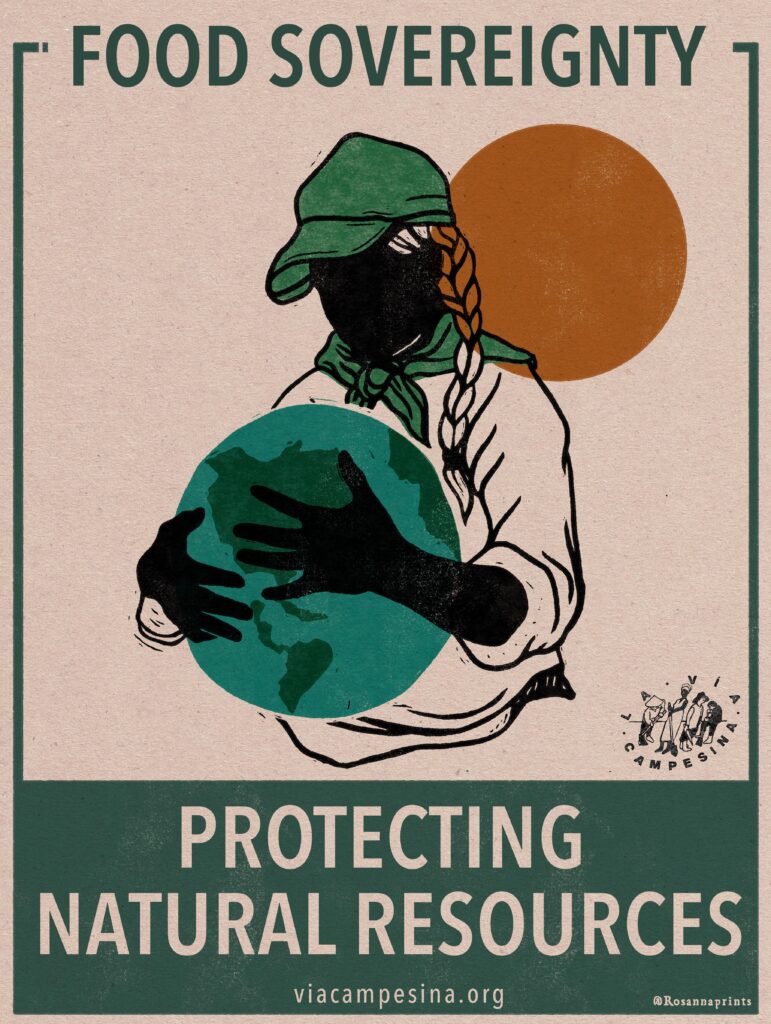
FOOD SOVEREIGNTY: PROTECTING NATURAL RESOURCES
Food sovereignty entails the sustainable care and use of natural resources especially land, water and seeds. We, who work the land, must have the right to practice sustainable managment of natural resources and to preserve biological diversity. This can only be done from a sound economic basis with security of tenure, healthy soils and reduced use of agro-chemicals.
Long-term sustainability demands a shift away from dependence on chemical inputs, on cash-crop monocultures and intensive, industrialized production models. Balanced and diversified naturals systems are required.
Genetic resources are the result of millenia of evolution and belong to all of humanity. They represent the careful work and knowledge of many generations of rural and indigenous peoples. The patenting and commercialization of genetic resources by private companies must be prohibited. The World Trade Organization’s Intellectual Property Rights Agreement is unacceptable. Farming communities have the right to freely use and protect the diverse genetic resources, including seeds, which have been developed by them throughout history. This is the basis for food sovereignty.
Food sovereignty: Reorganizing the Food Trade
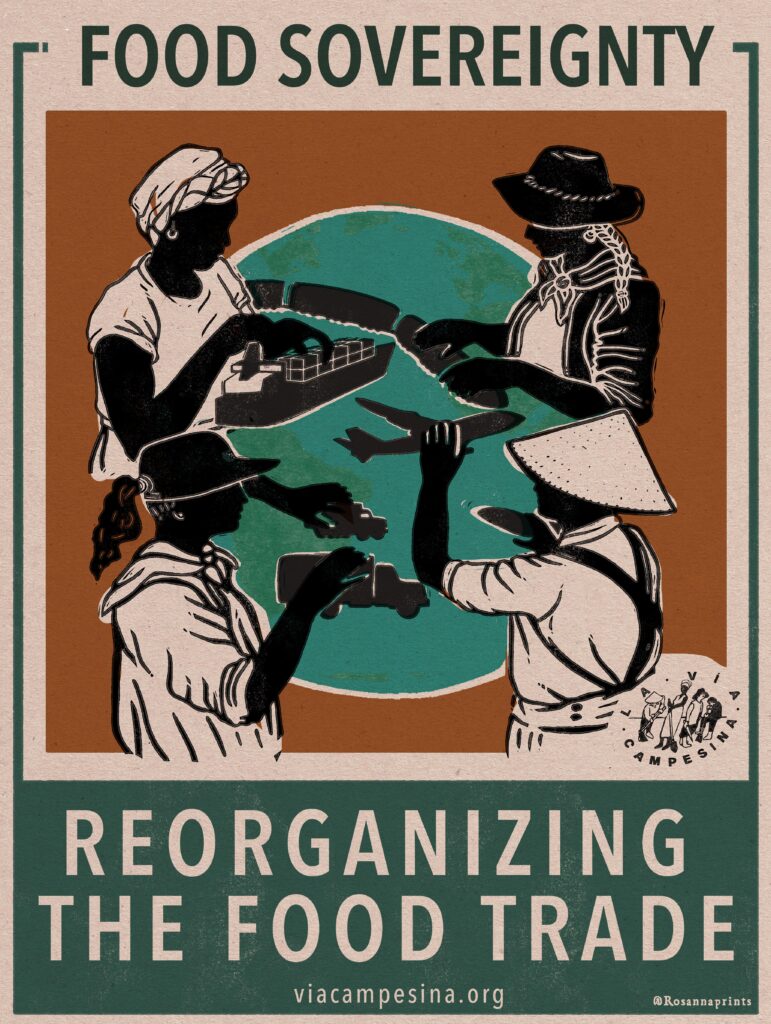
Food is first and foremost a source of nutrition and only secondarily an item of trade. National agricultural policies must priorize production for domestic consumption and food self-sufficiency. Food imports must not displace local production nor depress prices. This means that export dumping or subsidized export must cease. Peasant farmers have the right to produce essential food staples for their countries and to control the marketing of their products.
Food prices in domestic and international markets must be regulated and reflect the true costs of producing that food. This would ensure that peasant families have adequate incomes. It is unacceptable that the trade in foodstuffs continues to be based on the economic exploitation of the most vulnerable — the lowest earning producers — and the further degradation of the environment.
It is equally unacceptable that trade and production decisions are increasingly dictated by the need for foreign currency to meet high debt loads. These debts place a disproportionate burden on rural peoples. We demand that these debts be forgiven.
Food Sovereignty: Ending the Globalization of Hunger
Food sovereignty is undermined by multilateral institutions and by speculative capital. The growing control of multinational corporations over agricultural policies has been facilitated by the economic policies of multilateral organizations such as WTO, Work Bank and the IMF. We demand the regulation and taxation of speculative capital and a strictly enforced Code of Conduct for transnational corporations.
Social Peace: a Pre-requisite to Food Sovereignty
Everyone has the right to be free from violence. Food must not be used as a weapon. Increasing levels of poverty and marginalization in the countryside, along with the growing oppression of ethnic minorities and indigenous populations aggravate situations of injustice and hopelessness. The ongoing displacement, forced urbanization and repression of peasants cannot be tolerated. We denounce the increasing incidence of racism in the countryside.
Food Sovereignty: Democratic control
Peasants and small farmers must have direct input into formulating agricultural policies at all levels. This includes the current FAO World Food Summit from which we have been excluded. The United Nations and related organizations will have to undergo a process of democratization to enable this to become a reality. Everyone has the right to honest, accurate information and open and democratic decision-making. These rights form the basis of good governance, accountability and equal participation in economic, political and social life, free from all forms of discrimination. Rural women, in particular, must be granted direct and active decision-making on food and rural issues.


